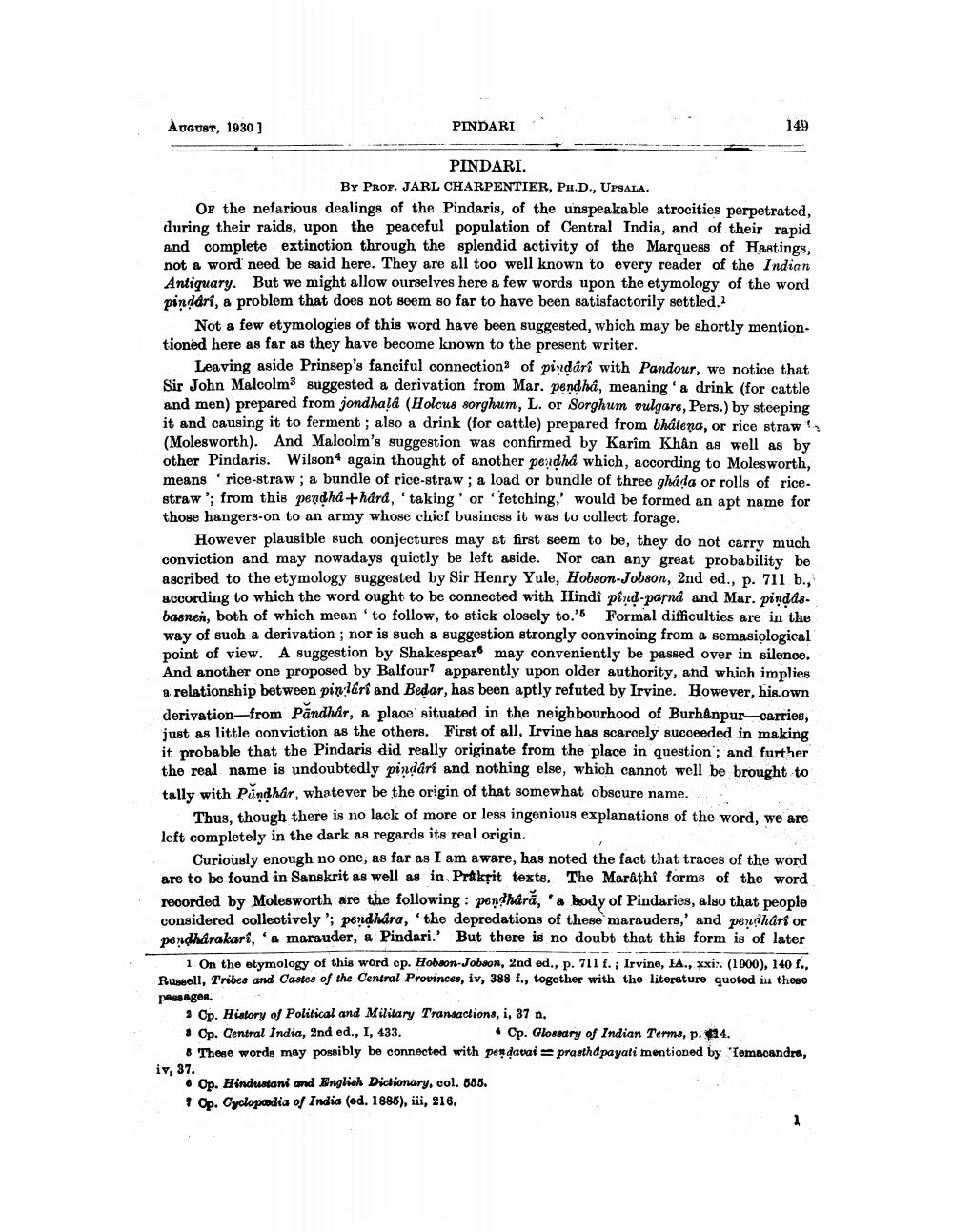________________
August, 1930)
PINDARI
149
PINDARI.
BY PROF. JARL CHARPENTIER, PH.D., UPSALA. Of the nefarious dealings of the Pindaris, of the unspeakable atrocities perpetrated, during their raids, upon the peaceful population of Central India, and of their rapid and complete extinction through the splendid activity of the Marquess of Hastings, not a word need be said here. They are all too well known to every reader of the Indian Antiguary. But we might allow ourselves here a few words upon the etymology of the word pindarí, a problem that does not seem so far to have been satisfactorily settled.2
Not a few etymologies of this word have been suggested, which may be shortly mention. tioned here as far as they have become known to the present writer.
Leaving aside Prinsep's fanciful connection of pindari with Pandour, we notice that Sir John Malcolm suggested a derivation from Mar. pendha, meaning a drink (for cattle and men) prepared from jondhalá (Holcus sorghum, L. or Sorghum vulgare, Pers.) by steeping it and causing it to ferment; also a drink (for cattle) prepared from bhâtena, or rice straw! (Molesworth). And Malcolm's suggestion was confirmed by Karim Khân as well as by other Pindaris. Wilson* again thought of another pendhå which, according to Molesworth, means 'rice-straw; a bundle of rice-straw; a load or bundle of three ghada or rolls of rice. straw'; from this pendha+hára, 'taking' or 'fetching,' would be formed an apt name for those hangers-on to an army whose chief business it was to collect forage.
However plausible such conjectures may at first seem to be, they do not carry much conviction and may nowadays quictly be left aside. Nor can any great probability be ascribed to the etymology suggested by Sir Henry Yule, Hobson-Jobson, 2nd ed., p. 711 b., according to which the word ought to be connected with Hindi pird-parna and Mar. pindås. barnen, both of which mean' to follow, to stick closely to.' Formal difficulties are in the way of such a derivation ; nor is such a suggestion strongly convincing from a semasiological point of view. A suggestion by Shakespear may conveniently be passed over in silenoe. And another one proposed by Balfour' apparently upon older authority, and which implies a relationship between pinlari and Bedar, has been aptly refuted by Irvine. However, his.own derivation from Påndhár, a place' situated in the neighbourhood of Burhanpur-carries, just as little conviction as the others. First of all, Irvine has scarcely succeeded in making it probable that the Pindaris did really originate from the place in question; and further the real name is undoubtedly pindárf and nothing else, which cannot well be brought to tally with Pundhár, whatever be the origin of that somewhat obscure name.
Thus, though there is no lack of more or less ingenious explanations of the word, we are left completely in the dark as regards its real origin.
Curiously enough no one, as far as I am aware, has noted the fact that traces of the word are to be found in Sanskrit as well as in Prakrit texts. The Marathi forms of the word recorded by Molesworth are the following: pendhara, 'a body of Pindaries, also that people considered collectively '; pendhara, 'the depredations of these marauders,' and pendhárí or pendhárakarí, a marauder, a Pindari.' But there is no doubt that this form is of later
1 On the etymology of this word op. Hobson-Jobson, 2nd ed., p. 711 f. ; Irvine, IA., xxis (1900), 140 f.. Russell. Tribes and Castes of the Central Provinces, iv, 388 f., together with tho literature quoted in these pensages.
1 Op. History of Political and Military Transactions, i, 37 n. 3 Op. Central India, 2nd ed., I, 433.
Cp. Glossary of Indian Terma, p. 04. 8 These words may possibly be connected with perdavai = prasthapayati mentioned by 'Temacandra, iv, 37.
• Op. Hindustani and English Dictionary, ool. 668. 1 Op. Cyclopaedia of India (od. 1885), ili, 216.




